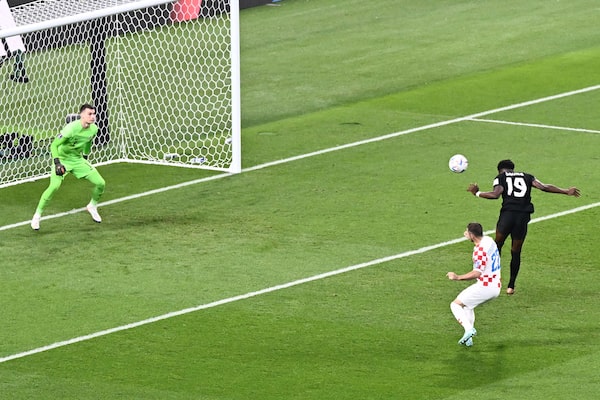
Canada's Alphonso Davies scores his team's goal during the Qatar 2022 World Cup Group F game against Croatia at the Khalifa International Stadium in Doha on Nov. 27.JEWEL SAMAD/AFP/Getty Images
The shot came in fast, at waist level, rocketing off the foot of England striker Marcus Rashford. Welsh defender Neco Williams bent over almost double to stick his head between the ball and the goal, sending it pinging up the pitch, and himself flying backwards.
Hitting the ground, Williams stayed down for several minutes, as medics rushed onto the pitch. He eventually got up and rejoined the game, still looking unsteady, but had to be taken off 10 minutes later, walking slowly, his face pale and waxy.
It was a “suspected-concussion substitute,” the stadium announcer explained to the crowd. “This substitution prioritizes player welfare and it’s an approved additional substitution.”
Players have used their heads to try to score more than 135 times in the first two weeks of this World Cup, resulting in some fantastic goals, including Alphonso Davies’s, Canada’s first at this level. There have been hundreds of other headers, dozens each game, as players compete for possession in the air and desperately attempt to clear attacking balls.
They’re a vital part of soccer, but also, it is increasingly being recognized, a potentially dangerous one. The Qatar World Cup is the first since researchers found professional soccer players are more than three times more likely than the public to suffer from dementia and other neurological disorders, and some sporting bodies have moved to reduce the amount of headers players perform.
Balls used in competitions such as the World Cup weigh around half a kilo, and can strike a player’s head at speeds of around 60 to 80 kilometres an hour, studies have found. While a single header is not likely to cause permanent damage – though extremely high impacts can cause concussions, as Williams found – repeated impacts take a toll.
British charity Headway criticized the decision to allow Williams to play on in Tuesday’s game, with the group’s chief executive, Luke Griggs, saying “medics are being forced to make snap judgements under pressure, which is resulting in players being allowed to stay on the field despite the assumed presence of at least some doubt over potential concussion.”
Griggs said FIFA should introduce a temporary-concussion substitute whenever there is a question about a player’s condition, similar to how rugby uses blood-bin rules to handle players who need to seek temporary medical attention.
“The rule is supposed to be ‘if in doubt, sit it out’ not ‘play on and see how it goes’,” Griggs said, adding FIFA’s “complacency when it comes to brain health is frankly shocking, it’s time to take control of this situation and look after the players.”
On Monday, the Scottish Football Association banned teams from practising headers the days before or after matches, and limited the number of training sessions that involve “repeated headers” to once a week.
“While the research continues to develop, what we already know about heading and its effects on the brain suggests that there is measurable memory impairment lasting 24 to 48 hours following a series of headers,” John MacLean, a medical consultant for the Scottish FA, said in a statement.
“Brain-scan changes have also been reported in footballers that may be linked to heading,” the doctor added. “Therefore, the goal is to reduce any potential cumulative effect of heading by reducing the overall exposure to heading in training.”
The move comes after soccer authorities in England and Scotland issued guidance that children under 11 should not be taught to head balls, and introduced limits on “higher-force” headers in the adult game.
Pressure has been growing for action in Britain in particular since hearings last year, when lawmakers accused the government of a “dereliction of duty” and said “sport has been allowed to mark its own homework” when it came to preventing concussions and other brain injuries.
“Whether an elite athlete or a Saturday footballer, too much has been left to chance with the results of serious brain injury for those involved,” Member of Parliament Julian Knight said at the time.
Dawn Astle, whose father – former England international Jeff Astle – died in 2002 of a degenerative brain disease, welcomed the Scottish FA’s new rules, writing on Twitter that they were “another landmark ruling” in the campaign to reduce the risks of dementia in soccer.
“Former players were dying and nobody gave a damn,” she told Britain’s Press Association last year.
“You can work in a warehouse and get knocked out and it gets reported, but if it happens at a football match, nothing. Because it’s sport, it doesn’t matter.
“Football is a sport enjoyed by millions of people around the world but to my dad it was just his job,” she added. “He should be afforded the same protection from known risks as in any other job.”
Rob Koehler, director general of Global Athlete, which advocates for athletes on a number of issues, agreed. He said athletes should be involved in consultations on rule changes to protect them, and provided data on the risks they might face.
“Informed decision are key for athlete protection and safety,” Koehler said. “Sport cannot be trusted to self regulate in the interest of athletes’ wellbeing.”